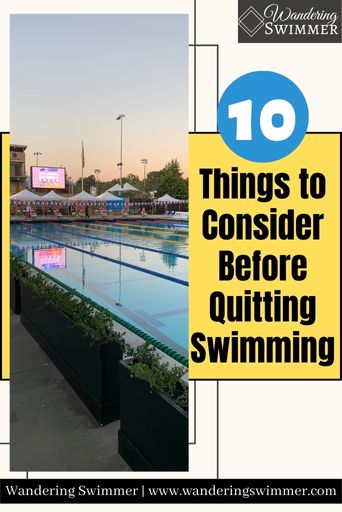In almost twenty years of swimming, I’ve seen my fair share of swimmers leave the sport. Personally, I quit swimming for three years following the end of my collegiate career before coming back.
All, that is to say, is that quitting swimming isn’t the end of the world. People join and leave the sport daily. And at the end of the day, swimming will always be there.
Related article: Is Quitting Swimming the Right Thing to Do?
Knowing when, why, and how to quit swimming can be a bit more tricky. We feel this is an incredibly personal decision that has several factors to it.
If you’re thinking of leaving the sport, here are 10 things to consider before quitting swimming.
Disclosure: This post may contain affiliate links, meaning we earn a small commission at no cost to you if you purchase something through one of our links. As an Amazon Associate, we earn from qualifying purchases. Please check out our disclosure page for more information.

- 10 Questions to Ask Before Quitting Swimming
- 1. Do You Really Want to Quit Swimming?
- 2. Are You Ready to No Longer Be a Swimmer?
- 3. What Will You Do with Your Free Time?
- 4. How Will You Handle Any Regret?
- 5. Before Quitting, Consider Anything Pending
- 6. Are You Ready to Change Your Diet?
- 7. Consider How Your Body May Change
- 8. What About My Friends?
- 9. Do You Have Any School Obligations?
- 10. Swimming Will Always Be There
- In Closing
- Bonus Content
- Want to Improve at the Pool?
10 Questions to Ask Before Quitting Swimming
1. Do You Really Want to Quit Swimming?
One thing to consider before quitting swimming is do you really want to leave the sport? Or do you really just want/need a break?
Sometimes what you’re facing isn’t the desire to hang up your cap and goggles for good. Instead, your mind and body are saying they need some recovery time. A few mornings to sleep in and rest. A day or two away from the pool.
And that’s 100% okay. Your coach and parents may not think so but we believe that pushing through rough patches isn’t always the right option.
Related article: How to Tell Your Coach You’re Quitting Swimming
As an athlete, you face a lot of stress and pressure. And sometimes you need a day off to collect yourself mentally and physically before tackling practice again.
Just as sometimes what you need isn’t to quit swimming altogether. Rather, you need more time away from it and still maintain enough practice to keep you in swimming shape.
It may not be ideal but it can give you a better feeling as to whether you’re ready to leave or just needed an extended break.
2. Are You Ready to No Longer Be a Swimmer?
It’s a funny question to ask but for some swimmers, it’s an important one. When you’ve spent countless hours in the pool for several years, a lot of your identity is tied up in swimming. More than you would expect.
You’re known as ‘the swimmer’. People ask you how practice went, how many miles/kilometers you swam, and what meets you have coming up.
When you quit swimming, it may be stressful or uncomfortable to answer those types of questions. You may find it hard to even tell people that you’re no longer swimming.
And while you’re more than just a swimmer, it’s not easy to simply turn off the years spent in the sport. Nor can you dismiss that part of you that grew and developed out of swimming.
More Content for You: How to Return to the Pool After a Long Break
Some swimmers may find that they’re facing a type of personality dilemma due to this.
‘Who am I now without swimming’ comes into play. When you’ve devoted most of your life to the sport, it’s not as simple as stepping away.
The same is true when kids grow up and leave the house, and parents are left with an empty nest. The thing they nurtured and helped grow for many years is now gone, and they’re left with the question of ‘what next?’
Much like recent empty nesters, you no longer have something to develop, grow, and focus your energy on. And it can leave you feeling a bit lost and astray.
This leads us to our next consideration.
3. What Will You Do with Your Free Time?
Swimming eats up hours of your day. Without it, you suddenly have more time on your hands than you know what to do with.
So before you quit swimming, consider what you’re going to do with your free time.
It’s easy to say that you’ll be productive with the new hours that you have at hand. But it’s also incredibly easy to waste them away without realizing it.
Should you enjoy your new free time? Of course! It’s well deserved.
But have some type of plan or accountability partner to ensure you’re not indulging too much. Most swimmers thrive on challenges and accomplishing tasks.
More Content for You: 10 Ways Swim Teams Can Give Back to Their Community
Without this sort of drive in your life, you may feel anxious and pent up with energy. And as mentioned before, you may start to question who you are when you no longer have the sport to help cultivate those desires.
We highly recommend that you have an idea or goal in mind for life after swimming. Whether that’s picking up a new hobby or continuing one that you had before swimming.
Challenging yourself and setting goals will go a long way to help with any mental roadblocks you may hit after you finish swimming.
4. How Will You Handle Any Regret?
You may not think you’ll feel regret or doubt when you first quit swimming but there will be days when the feeling starts to set in.
When you see teammates having fun at a swim meet or going on a travel trip, you may be left with second thoughts. And you may question if you made the right decision.
And that’s normal!
Quitting swimming is a hard choice, especially if you’ve been so tightly tied to the sport. It’s why we encourage all swimmers who want to quit to consider why they want to leave. And if they’re stepping away from anything left unfinished.
Related article: Overcoming Failure in Swimming and Finding Success
Leaving the sport without accomplishing all your goals can leave room for regret. If at all possible, consider trying to reach some of those goals before you quit. Or make allowances for them so you can quit with as little regret as possible.
And remember: swimming will always be there. Even if you quit, you can come back to the sport.
5. Before Quitting, Consider Anything Pending
This one can go hand-in-hand with regret from quitting swimming and we say to take it with a grain of salt. Because every situation is different and you know yourself best.
But before you quit swimming, consider any upcoming competition. Perhaps not for you but for your teammates.
If you’re ready to quit, you should have the choice to do so. But please don’t consider quitting the week of or leading up to a championship meet. Especially if you’re on a relay and your teammates are depending on you.
Related article: 8 Things to Do Before You Quit Swimming
Yes, your mental and physical health is important. As is the ability to walk away on your own terms. But if you know for sure that you can’t make it the last few weeks leading up to an important meet, be upfront and honest with your team.
If you can stick it out for those few weeks, then consider doing so. Again, be honest with your teammates so they know what you’re going through. And they know what to expect from you.
Again, take this consideration with a grain of salt. Because your health does come first and if you can’t do it, then you can’t do it.
6. Are You Ready to Change Your Diet?
Again, this may seem like a funny question. But take a moment to think about your diet compared to non-athletes that you know. Your caloric intake is far greater than theirs.
Once you quit swimming, you have to consider what your diet will look like post swimming.
The frequency, amount, and types of food that you eat as a swimmer will need to change following the end of your swimming career. This is especially important if you don’t plan to pick up another sport or don’t continue to work out.
More Content for You: What Should You Eat Before Swim Practice?
You should speak with a nutritionist to discuss nutrition options for when you quit swimming. This can help ensure you’re getting the right balance of food for your new levels of activity.
7. Consider How Your Body May Change
Swimming isn’t just a sport. It’s also a great form of exercise. And if you stop swimming, you’ll find that your body will start to adjust to the decrease in exercise.
Some changes you may see yourself go through are:
- Decrease in muscle mass and/or definition
- Muscles aren’t as strong
- Body hair may start to come back
- Some body hair may start to darken without the chemicals to bleach it
- Your skin will no longer smell like chlorine (1-3 months after you quit, depending on the pool)
- Natural oils in your hair will come back and you won’t have chlorine dried hair
- Based on your activity level, your sleep schedule may adjust itself
- Your menstrual cycle may become more regular
- You may have heavier bleeding and/or more cramps during your period based on your activity level
There are other changes that your body may go through that aren’t on this list. Everyone is different in what they experience after quitting swimming.
If you suspect that something isn’t normal though, please speak with your healthcare provider.
8. What About My Friends?
You can still stay friends with your teammates even after you quit swimming. No rule says you can’t hang out or keep in contact with them.
But you should be aware that you’re stepping into a different world now. One without swimming. And it can cause a bit of disconnect between your teammates who still swim.
They’ll want to update you about things going on in the swimming world but if you’re no longer connected to it, you won’t have that common ground anymore.
More Content for You: The 8 Best Swim Bags for Swimmers (And Water Enthusiasts)
This isn’t a bad thing but it can cause you and your teammates to naturally start to drift away. Their schedule will stay busy with practices and swim meets. While you may pick up something new with a different group of people.
And while this isn’t done on purpose, if you see your teammates ‘moving on’ without you, you may feel lonely or excluded.
Some swimmers joined specifically to be with their friends. And if your friendship with your teammates is something that’s important to you, you may want to consider this before quitting swimming.
That said, you can have swimming and non-swimming friends and still make things work. It may take a bit more effort to balance everyone’s different schedules, but it is possible. Just something to consider 🙂
9. Do You Have Any School Obligations?
If you’re swimming in college on a scholarship or are swimming on a high school team, consider what school obligations may be impacted. Mainly, any scholarship funding you’re receiving for swimming. Or a class period dedicated to swim practice in high school.
You’ll want to speak with your coach to get an idea of how your decision will impact any of these cases.
For high school swimmers, you may need to change your school schedule around and pick a different class to take. Depending on when you’re quitting, it may be too late to switch classes. In a case like this, ask if you can be a team manager instead.
More Content for You: The 7 Best Swim Shampoos to Remove Chlorine
Collegiate swimmers with an athletic scholarship will want to consider how their scholarship will be affected. With the loss of your athletic scholarship, you’ll need to find other ways to pay for schooling. Or transfer to a more affordable school.
None of these are the end of the world or are reasons why you shouldn’t quit. But you do need to consider them before quitting swimming, as they could negatively impact your school year(s).
10. Swimming Will Always Be There
One final thing to consider before quitting swimming. And that’s that swimming will always be there. For some, this may sound ominous. But for others the reminder offers comfort.
Because even though you’re leaving the sport now, it doesn’t mean that you can’t come back. Whether you decide to start swimming again for exercise or competition, the choice is yours.
Related article: Why I Started (and Keep) Swimming
You may realize that after a few months or years away from swimming that you want to pick it up again. And you can! No one said that once you leave swimming that you can’t come back to it.
Likewise, you may never want (or plan) to come back. And that’s okay, too!
Regardless of your decision or how you feel in the years to come, swimming will always be there for you to return to. If you so desire 🙂
In Closing
Quitting swimming isn’t always the easiest of choices. Take time to consider the different aspects swimming has in your life and how it’ll affect those areas when you’re no longer swimming. You may find that you’re not as ready to take that jump. Or you may realize that the decision isn’t that terrifying after all.
As always, happy swimming!
Chevron
Bonus Content
14 Reasons to Join Masters Swimming: Masters Swimming offers a variety of different benefits to adult swimmers. Here’s 14 reasons why you should join Masters Swimming.
Swimming Secrets: What Really Happens at Swim Practice: Ever watch a swim practice and wonder what’s really going on? Here are 14 secrets about what really happens at swim practice.

Want to Improve at the Pool?
Join swimmers and swim parents to receive my free newsletter and receive a free Swimming Glossary e-book as a thanks!
Every month you’ll receive tips and coaching to help you find success at the pool.
About

Chevron is a current competitive swimmer with almost 20 years of experience in the pool. And although she fell into the sport by accident in her high school years, she still trains daily and competes throughout the year. She’s committed to providing guidance to all levels of swimmers and believes that everyone should know how to swim.
